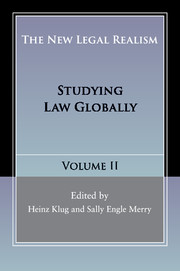Book contents
- Frontmatter
- Dedication
- Contents
- List of contributors
- Preface to The New Legal Realism, Volumes I and II
- 1 Introduction
- Section I The Globalization of Law
- Section II The Global Transfer of Norms
- Section III global institutions and the changing roles of judges and lawyers
- Section IV Global Justice
- 11 The Irreconcilable Goals of Transitional Justice
- 12 Pushing States to Prosecute Atrocity: The Inter-American Court and Positive Complementarity
- 13 When Law and Social Science Diverge: Causation in the International Law of Incitement to Commit Genocide
- Index
- References
11 - The Irreconcilable Goals of Transitional Justice
from Section IV - Global Justice
Published online by Cambridge University Press: 05 May 2016
- Frontmatter
- Dedication
- Contents
- List of contributors
- Preface to The New Legal Realism, Volumes I and II
- 1 Introduction
- Section I The Globalization of Law
- Section II The Global Transfer of Norms
- Section III global institutions and the changing roles of judges and lawyers
- Section IV Global Justice
- 11 The Irreconcilable Goals of Transitional Justice
- 12 Pushing States to Prosecute Atrocity: The Inter-American Court and Positive Complementarity
- 13 When Law and Social Science Diverge: Causation in the International Law of Incitement to Commit Genocide
- Index
- References
Summary
Introduction
In 1994, Madeleine Albright, then Ambassador to the United Nations, gave a speech that made the case for establishing the International Criminal Tribunal for the Former Yugoslavia (ICTY). Albright addressed potential critics of the court by arguing that “establishing the truth about what happened in Bosnia is essential to – not an obstacle to – national reconciliation” (Bass 2000, 263). Although this was once a controversial claim, the idea that a durable peace requires countries to address past violence is now widely held and promoted by influential leaders and institutions under the broad heading of “transitional justice.” The United Nations Department of Peacekeeping renamed its Justice and Security Sector Reform Team the “Security Sector Reform and Transitional Justice Unit” (UNDP 2003). A number of specialized organizations, institutes, and research networks now sponsor comparative research or training in transitional justice. In recent decades, numerous transitional justice institutions, most notably truth commissions and war crimes tribunals, have been established around the world.
Transitional justice has been associated with an array of goals, including the pursuit of justice and repair in response to past wrongs, the goal of advancing progress in the institutionalization of human rights, the goal of establishing rule of law, and the pursuit of democratizing political reform. The promotion of transitional justice institutions as a basis for advancing political reconciliation might appear puzzling, however. Truth commissions and war crimes tribunals investigate divisive and violent histories. As a result, they are routinely accused of threatening political reconciliation by “opening old wounds,” generating political instability, or interfering with forward-looking political change. In the post–Cold War context, debates on transitional justice centered on dilemmas and tensions associated with efforts to reckon with systematic abuse, which were commonly framed as tensions between the goals of “justice” and “reconciliation.” How did these goals, once thought to be deeply at odds with each other, come to be seen as mutually reinforcing and complementary? Is it possible, and is it desirable, to overcome the tensions and dilemmas that have been associated with transitional justice?
Albright's claims regarding the role of the ICTY echoed a general shift in thinking about transitional justice that occurred as a number of scholars and policy makers began to assert that dilemmas once associated with transitional justice were illusory.
- Type
- Chapter
- Information
- The New Legal RealismStudying Law Globally, pp. 201 - 224Publisher: Cambridge University PressPrint publication year: 2016



